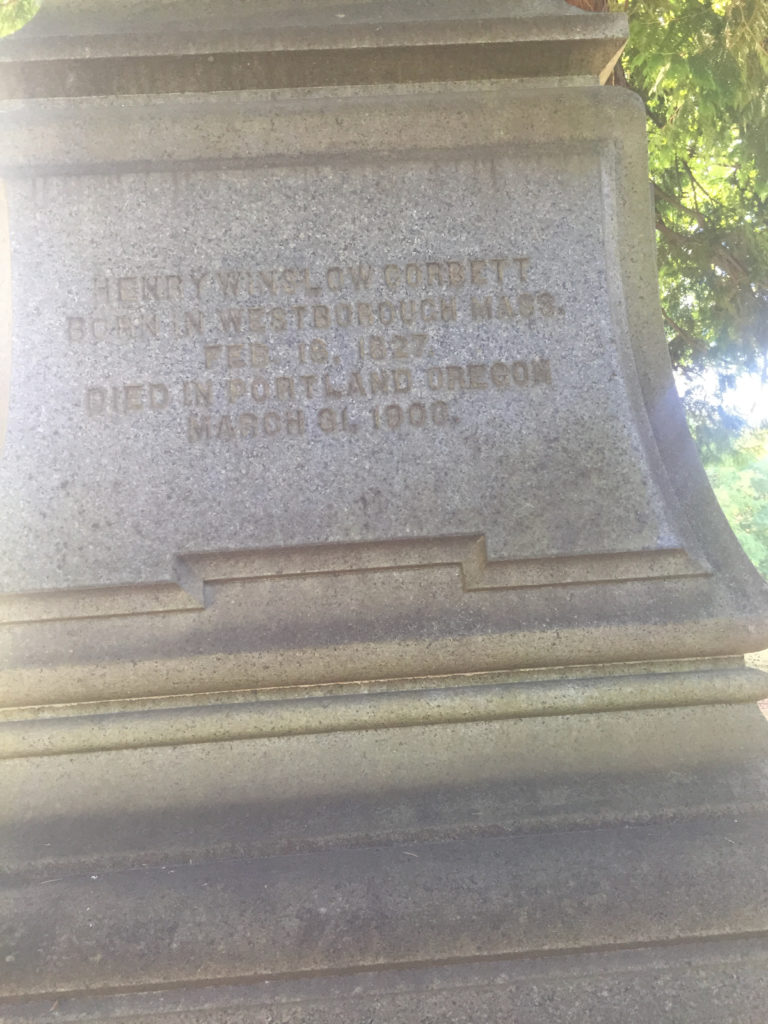Erik Visits an American Grave, Part 759
This is the grave of Henry Corbett.

Born in 1827 in Westborough, Massachusetts, Corbett grew up pretty well off. His father ran a tool factory and then later a hotel in New York. Henry only had standard formal education and did not attend college. Instead, he went into a dry goods business as a teen after he moved to New York City in 1843. He did fairly well in the business and was ambitious.
In 1850, Corbett decided to take a big risk. The U.S. had taken over Oregon and whites were moving to the Willamette Valley at a pretty good clip, displacing the Native populations there. Corbett and his partners decided to create a business in Portland. Corbett was the front man and so he moved to Oregon. The business took off almost immediately when he opened it in 1851. The first shipment of goods made a $20,000 profit. He hired some people to run the business for him and returned to New York in 1852 where he bought out his partners. By 1860, his was a wholesale farm and hardware business and he was one of the richest men in the new state. He became a banker as well and then a senator when the Oregon legislature chose him to go to Washington in 1866.
Corbett was an old Whig and then a Republican. He served one term in the Senate that began in 1867. His main interest there was banking and in that he was a pretty typical Gilded Age Republican who was more interested in debt issues than Black rights during Reconstruction. He was a consistent Republican vote on all those issues, but it was the nation honoring debt from the Civil War that most motivated him as a politician. Exciting times. But Corbett was a rich guy and he definitely represented his interests.
After his one term in the Senate, Corbett took a long trip to Europe and then came back to Oregon, where he became even richer. He took over The Oregonian in 1870, making it the state’s paper of record. He was a big philanthropist in the city as well, spending bits of his fortune on this and that, such as art museums and libraries. He was a rock-ribbed Republican through and through who thought the rich deserved everything they got and that they should lead society in a well-ordered march to progress, which was defined as what helped them financially. Thus he was involved in railroads, water works, and a whole host of other business interests.
Possibly the most important thing Corbett was involved with was his failure to return to the Senate. In 1896, Republican leaders asked him to do so. But this was also the peak power of the Populists. It’s worth noting here that the Populists themselves had a certain amount of power in some states, but that their overall reform agenda had a lot of appeal to a lot of Americans. That included Oregon, which did not have a strong Populist Party but did have a lot of younger reformers who wanted to move beyond the corruption of the Gilded Age. And to them, no one represented that more than Corbett, who they saw as a man well past his use except as a tool of the wealthy. Of course, Senate picks still came out of the state legislature. So a young Populist named William U’Ren, who would become one of the most important reformers in Oregon history, led a coalition to block Corbett’s election. The Senate was deadlocked and the previous senator, John Mitchell, had left office. So Oregon was without a senator. Therefore, the governor simply named Corbett to the office. But Oregon legislature balked and said that was unconstitutional. A year later, the legislature met again to figure this out. Corbett withdrew his name at that time. In 1901, the same thing happened. Corbett was the pick of the rich, but the legislature was deadlocked and he never did return to the Senate. All of this led to Oregon being a leader in the electoral reforms of the Progressive Era, such as the initiative, recall, and referendum, not to mention laying the groundwork for the passage of the Seventeenth Amendment in 1913. In fact, Oregon was the first state to pass a bill allowing for direct election of senators, in 1905.
All of this may have bothered Corbett personally, but he remained very rich and very conservative so he just ran his empire. He also did not live to see the political reforms that he hated, dying in 1903. He was 76 years old.
Henry Corbett is buried in River View Cemetery, Portland, Oregon.
If you would like this series to visit other senators elected in 1866, you can donate to cover the required expenses here. Garrett Davis is in Paris, Kentucky and Joshua Hill is in Madison, Georgia. Previous posts in this series are archived here.


